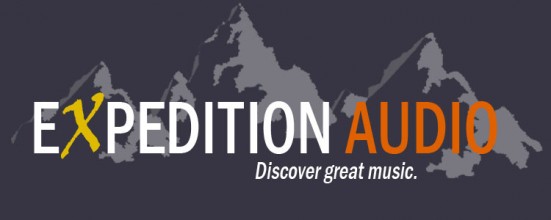Share This
Album at a Glance
Tags
Related Posts
Chris Potter Underground Orchestra: ‘Imaginary Cities’
Posted by Larry Isacson on Jan 22, 2015 in Jazz | 0 comments
Saxophonist and composer Chris Potter’s triumphant, expansive, visionary and boundary-blurring new release Imaginary Cities marks his second as leader for the ECM label, following 2012’s “The Sirens.” The creative impulse here stems, in part, as Chris himself puts it, from a “non-specific utopian idea of how the modern city could be better.” This idea is the impetus behind the album’s eponymous centerpiece suite, a four-part work embedded into the album’s fabric in its programmed placement as well as being an idea reflecting a more generalized societal concern for our contemporary lives.
“Imaginary Cities” features the debut of the largest ensemble yet assembled by Chris as leader, exceeding by one member and with slight personnel adjustments 2007’s “Song For Anyone” (Sunnyside). Further embedding in the form of two distinct quartets is heard and found in the sound and workings of the eleven-member ‘Underground Orchestra’ ensemble: Chris’s long-standing ‘Underground Quartet’ – Chris on saxophones, guitarist Adam Rogers, pianist Craig Taborn and drummer Nate Smith – and a string quartet - violinists Mark Feldman and Joyce Hamman, violist Lois Martin and cellist David Eggar. Steve Nelson, vibraphone and marimba, bassist Scott Colley and Fima Ephron on bass guitar complete the orchestra’s personnel.
The album opener, “Lament,” beginning elegiacally, concludes not in dejection but rather resolve. The “Imaginary Cities” suite – Compassion-Dualities-Disintegration-Rebuilding – the crux of this release, opening with a noble expression of social concern and fellowship, proceeds through notions of societal contrast and conflict both desirous of mutual action yet prone to conflict and breakdown, ultimately ascending toward the desired revivifying of a communally renewed and restored common environ in which we all may live and relate better. “Firefly” opens in skittering fashion before quickly finding footing and forward momentum, here as elsewhere, in the supercharged funk predilections so characteristic of the Underground Quartet. “Shadow Self,” opening with an extended string quartet statement, spotlights Chris’s bass clarinet deftness. With its use of drone, Arabian and Indian-melodic strains and long-spun Western-harmonized melody, the vast, clear, polyglot “Sky” is a grand summation of the album’s conceptual core.
Chris’s tenor, bold and biting, tough and tender, is magisterial throughout, the thrusting momentum of his solos never slackening. The orchestra, brawny yet lithe, is rhythmically spot-on, with Craig, Fima, Scott and Nate commandingly coaxing the ensemble. Adam Rogers and Steve Nelson contribute mightily, the string quartet expertly woven into the ensemble. It’s an exemplary overall achievement, and an early candidate for a “Best of 2015.”
Imaginary Cities, an album of great power and expressive range, is the recording premiere of saxophonist Chris Potter’s new Underground Orchestra. At the core of this larger ensemble is the personnel of his long-established Underground quartet – with Adam Rogers, Craig Taborn and Nate Smith – now joined by two bassists, a string quartet, and Potter’s old comrade from Dave Holland Quintet days, vibes and marimba virtuoso Steve Nelson.
The title composition is a suite, panoramic in its reach, with movements subtitled “Compassion”, “Dualities”, “Disintegration” and “Rebuilding”. The scope of the work, and its contrasting moods and thematic continuity, inspire some of very Potter’s finest playing, including some extraordinary solos. His saxes fly high above his imaginary cityscapes or launch into dialogues or group improvising with its gifted inhabitants. Four further pieces – “Lament”, “Firefly”, “Shadow Self” and “Sky” – extend the feeling of the suite, successfully combining both tightly written material and very open areas involving all members of the orchestra. References are multi-idiomatic and multicultural, and Potter, who counts Charlie Parker with Strings amongst his formative enthusiasms, had Arabic and Indian string sections in mind, as well as contemporary composition, when shaping this material. The track “Shadow Self”, meanwhile, reflects the influence of Béla Bartók.
Potter assembled the Underground Orchestra originally in response to an invitation to present music at Jazz at Lincoln Center in New York. “There was an idea that it could be something that I hadn’t done before. So I started with the Underground quartet, with Craig Taborn on acoustic piano in this case [as opposed to the Fender Rhodes he usually plays in the small group] and then kept adding more and more players. No bass player in the Underground group? Well, I’ll have two this time. In my mind I was hearing a real thick rhythm section sound, also with vibraphone and piano. The way Fima [Ephron] and Scott [Colley] play together and improvise together makes a lot of things work in this music. And then the strings … eight or nine years ago I’d done an album called Song for Anyone where I’d written a little for strings. I didn’t want a classical-meets-jazz feeling. I wanted it all to be completely integrated. And, in places, the lines between the written material and the improvised material would be a little blurred, and the strings would improvise, too.” Not the least of the achievements of Imaginary Cities is the way in which Potter has extended the tremendous rhythmic drive of his Underground band into his music for the larger group.
The concept of the four movement structure of “Imaginary Cities” emerged slowly: “It really evolved from the writing. I had this idea of imaginary cities, a non-specific utopian idea of how the modern city could be better. Not that I’m writing a manifesto of what I think urban planning could be…It just seemed like a compelling way to organize my thoughts. It started out just being one tune and then I saw how one theme could migrate to another mood and continue it and be another aspect of the same thing. So it ended up being four movements with thematic development through the whole thing.” Potter says that he conceives of the whole album – the suite and the four additional songs arranged for the same musicians – as one unified sound.
Since bursting onto the New York scene in 1989 as an 18-year-old prodigy with bebop icon Red Rodney, Potter has steered a steady course of growth as an instrumentalist and composer-arranger. A potent improviser and the youngest musician ever to win Denmark's Jazzpar Prize, he has forged an impressive discography that includes 15 albums as a leader and sideman appearances on 100 more. He has performed or recorded with such leading names in jazz as Herbie Hancock, Pat Metheny, Jim Hall, Paul Motian, Ray Brown, John Scofield and Dave Douglas, as well as with the Mingus Big Band. Potter made his ECM debut on Dave Holland’s 2000 album Prime Directive, following that with appearances on the bassist’s Not for Nothin’, Extended Play: Live at Birdland and What Goes Around. Along with featuring on Steve Swallow’s Always Pack Your Uniform on Top and Damaged in Transit, Potter collaborated with Paul Motian and Jason Moran on the 2010 ECM album Lost in a Dream. In 2013 ECM released The Sirens, Potter’s conceptual album inspired by The Odyssey of Homer, with a quintet featuring Craig Taborn, David Virelles, Larry Grenadier and Eric Harland. The album was greeted with a chorus of praise from international critics
Imaginary Cities was recorded in December 2013 in New York’s Avatar Studio and produced by Manfred Eicher. Release of the album is followed by US performances with the Underground Orchestra in New York and San Francisco. Source: ECM
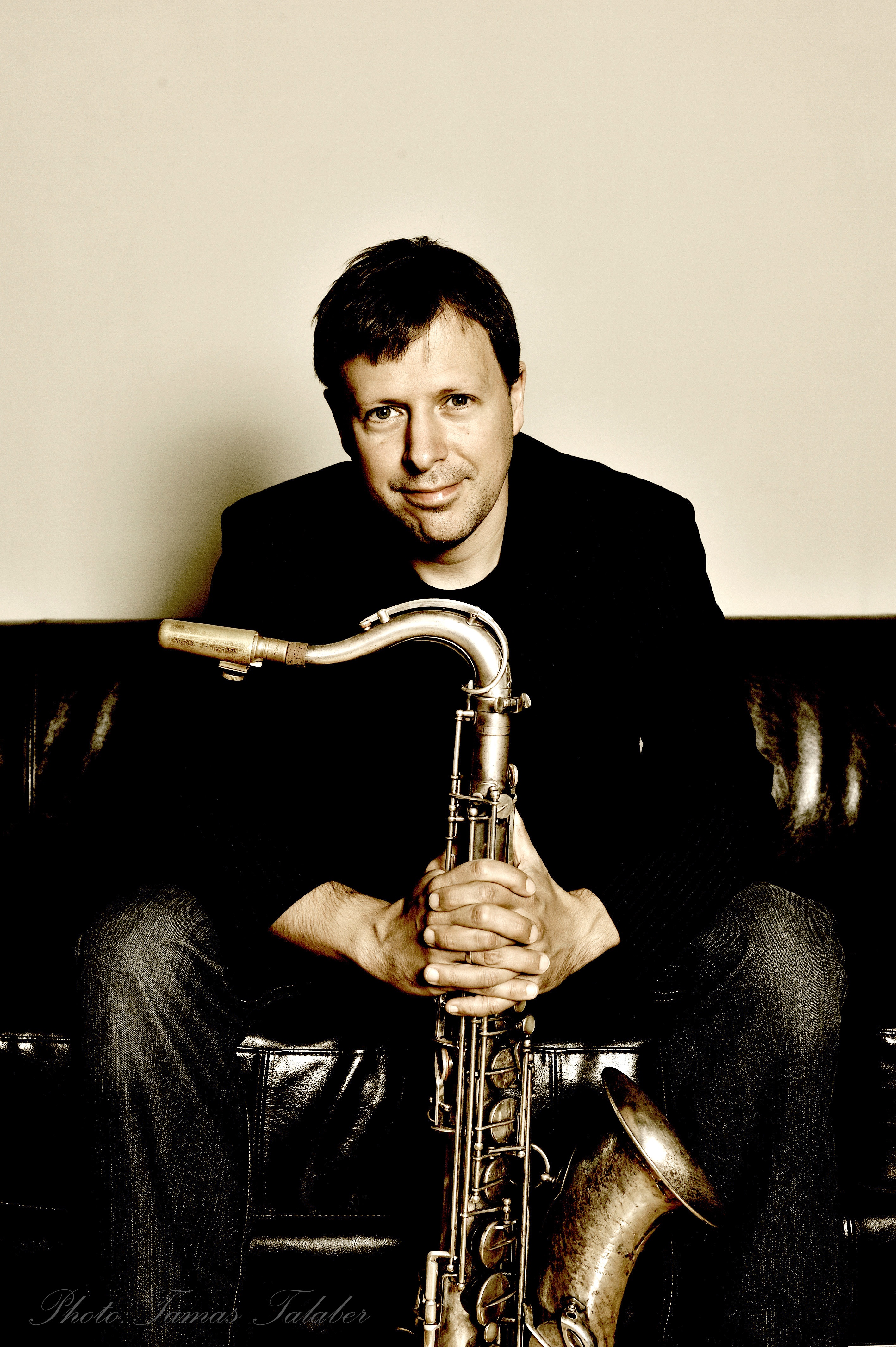 Chris Potter |
Chris Potter, saxophone & composition Chris Potter (born January 1, 1971) is an American jazz saxophonist, composer, and multi-instrumentalist. Chris Potter was born in Chicago, Illinois, but his family soon moved to Columbia, South Carolina, where he spent his formative years. Potter showed an early interest in a wide variety of different music and easily learned several instruments including the guitar and piano. He quickly realized after hearing Paul Desmond that the saxophone would be the vehicle that would best allow him to express himself musically. He played his first professional jazz gig on alto sax at age thirteen after mastering the complex musical language of Charlie Parker. He developed a devoted local following while performing with noted Columbia jazz musicians Johnny Helms and Terry Rosen as well as with others in the jazz community who nurtured what was recognized as a prodigious musical talent. After leaving Columbia upon his graduation from Dreher High School, Chris attended college in New York City, first at the New School, and later at the Manhattan School of Music. Upon his arrival in New York he began performing with bebop legend Red Rodney and quickly gained a reputation as a rising new star of the saxophone. Potter has released over 15 albums as a leader and performed as a sideman on more than 150 CDs with many leading musicians including Red Rodney, Pat Metheny, Marian McPartland, Patricia Barber, Kenny Werner, the Mingus Big Band, Paul Motian, Ray Brown, Jim Hall, James Moody, Dave Douglas, Joe Lovano, Wayne Krantz, Mike Mainieri, Steve Swallow, Steely Dan, Dave Holland, Joanne Brackeen, Adam Rogers and many more. Source: http://en.wikipedia.org/wiki/Chris_Potter_(jazz_saxophonist) |
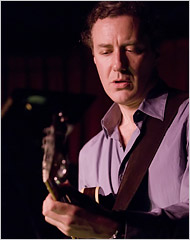 Adam Rogers |
Adam Rogers, guitars Adam Rogers is an American guitarist specializing in post bop, contemporary jazz, and classical music. Rogers has had a prolific and extensive session history as a recording guitarist having played on over 150 commercially released recordings. He is currently a member of the Chris Potter Underground in addition to leading his own “acoustic” jazz quartets and quintets as well as the genre bending electric trio DICE. He was a founding member and co leader of the eclectic group Lost Tribe. He has also performed and or recorded with Michael Brecker, Cassandra Wilson,Walter Becker, Norah Jones, John Patitucci, Paul Simon, John Zorn, Donny McCaslin, David Binney, Bill Evans (saxophonist), Dekel Bor, Simon Shaheen and Regina Carter among many others. He is a highly versatile player covering many areas of music but is best known for his work in the modern jazz idiom. Source: http://en.wikipedia.org/wiki/Adam_Rogers_%28musician%29 |
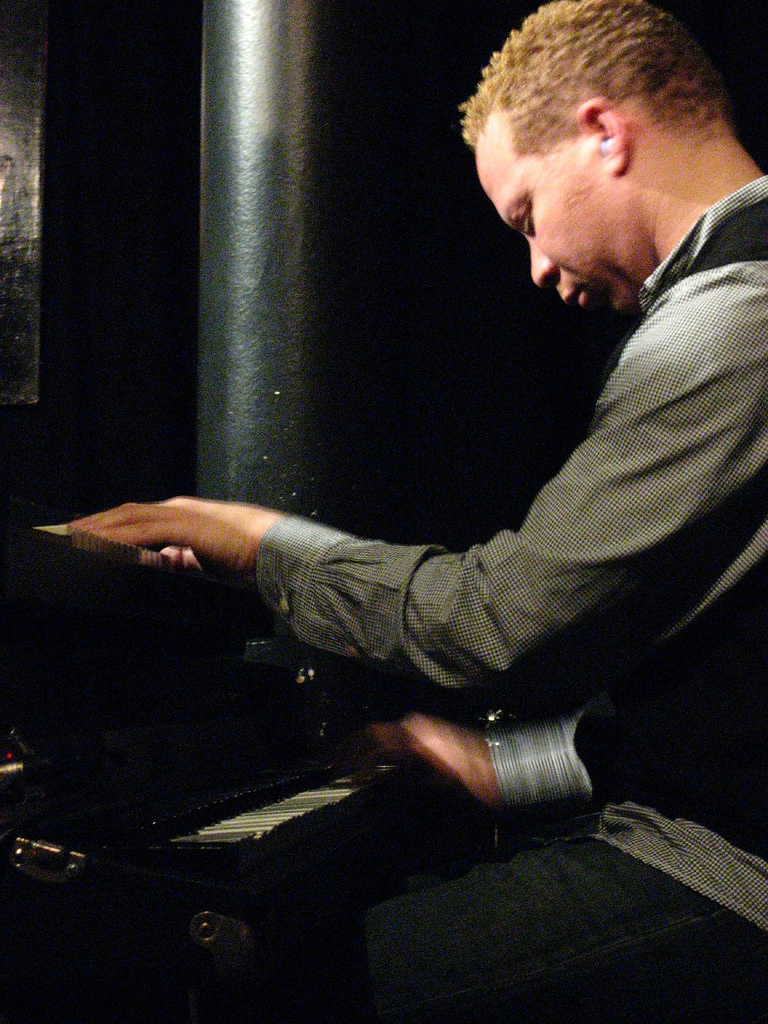 Craig Taborn |
Craig Taborn, piano Craig Marvin Taborn (/ˈteɪˌbɔːrn/; born February 20, 1970) is an American pianist, organist, keyboardist and composer. He works solo and in bands, mostly playing various forms of jazz. He started playing piano and Moog synthesizer as an adolescent and was influenced at an early stage by a wide range of music, including by the freedom expressed in recordings of free jazz and contemporary classical music. While still at university, Taborn toured and recorded with jazz saxophonist James Carter. Taborn went on to play with numerous other musicians in electronic and acoustic settings, while also building a reputation as a solo pianist. He has a range of styles, and often adapts his playing to the nature of the instrument and the sounds that he can make it produce. His improvising, particularly for solo piano, often adopts a modular approach, in which he begins with small units of melody and rhythm and then develops them into larger forms and structures. In 2011, Down Beat chose Taborn as winner of the electric keyboard category, as well as rising star in both the piano and organ categories. By the end of 2014, Taborn had released five albums under his own name and appeared on more than 80 as a sideman. |
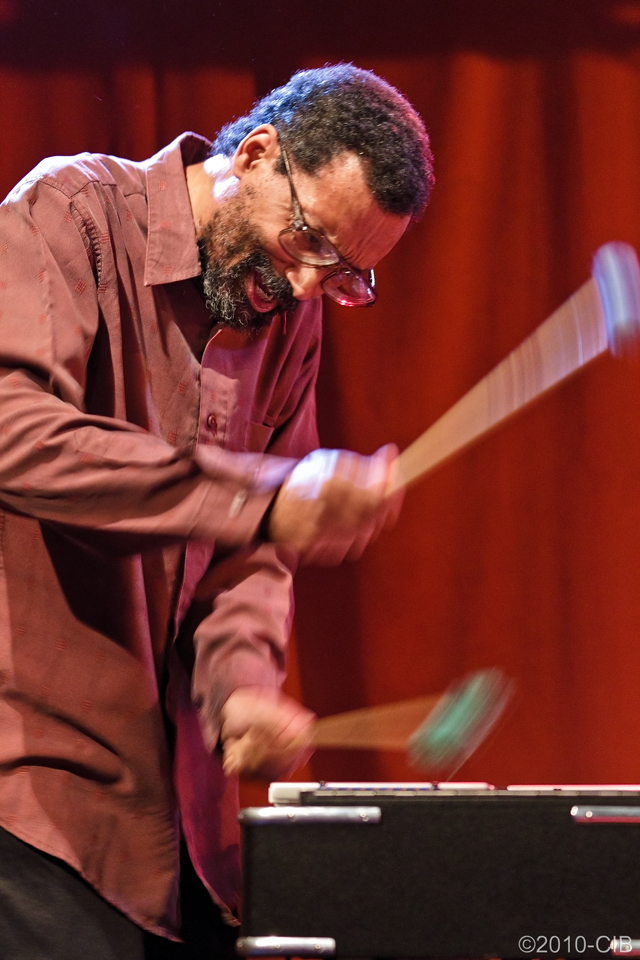 Steve Nelson |
Steve Nelson, vibraphone and marimba Steve Nelson (born August 11, 1954 in Pittsburgh, Pennsylvania) is an American vibraphonist, and has been a member of Dave Holland’s Quintet and Big Band for over a decade. He graduated from Rutgers University with both Master’s and Bachelor’s degrees in music, and his teaching activities have included a position at Princeton University.[1] He has appeared at concerts and festivals worldwide and has made recordings as the leader of his own group. As a resident of the New York area he has performed and recorded with many musicians, including Kenny Barron, Bobby Watson,Mulgrew Miller, David “Fathead” Newman, Johnny Griffin and Jackie McLean. His most recent recording as leader is Sound-Effect (2007), featuring pianist Mulgrew Miller, Peter Washington on bass, and Lewis Nash on drums. http://en.wikipedia.org/wiki/Steve_Nelson_%28vibraphonist%29 |
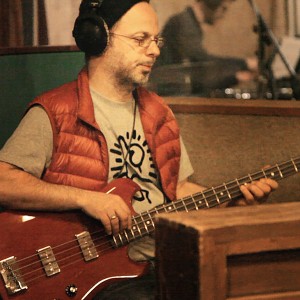 Fima Ephron |
Fima Ephron, bass guitar Fima Ephron is a British-American bassist. He began playing bass at age 13, attending a high school for music and the arts in New York, and was playing professionally by age 14. Ephron has performed or recorded with numerous eminent artists in the jazz, funk and progressive idioms. Among them are: Screaming Headless Torsos, Lost Tribe, Walter Becker, Gil Scott Heron, Natalie Merchant, Lunar Crush (Dave Fiuczynski & John Medeski), John Zorn, Kurt Rosenwinkle, Chris Potter, Don Byron, Vijay Iyer and many others. In 2001, Ephron released his debut as leader, entitled “Soul Machine,’ on the Tzadik label; the album was met high acclaim. In addition to his broad musical endeavors, Ephron is also a skilled carpenter and house builder. Source: http://www.fimaephron.com/ |
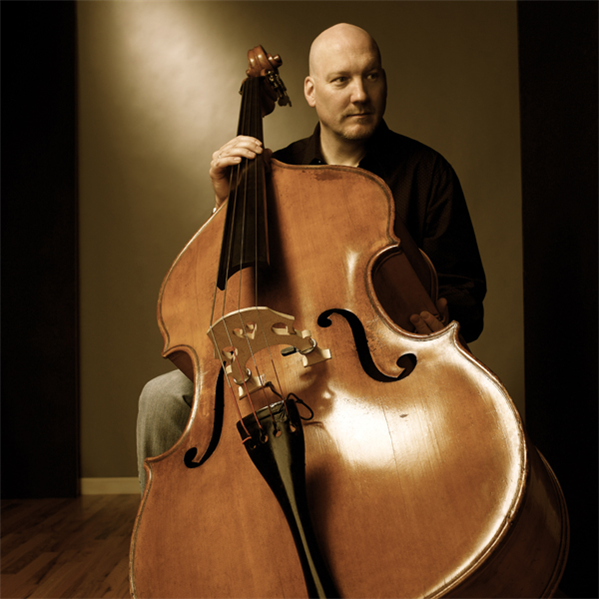 Scott Colley |
Scott Colley, acoustic bass Scott Colley is an American jazz bassist. Born on November 24, 1963 in Los Angeles, he began studying bass at age 11, and at 13 undertook studies with bassist Monty Budwig. After graduating from high school, he was granted a full scholarship to the California Institute for the Arts, where he focused on composition and jazz studies while also studying privately with Charlie Haden and classical bassist Fred Tinsley (of the Los Angeles Philharmonic). In 1986, he began touring and recording with jazz vocal legend Carmen McRae. In 1988 he graduated Cal Arts with a Bachelor of Music degree.His extensive and successful career as performer and recording artists has seen him collaborate with such jazz legends as Herbie Hancock, Jim Hall, Andrew Hill, and Michael Brecker. His remarkably empathetic skills, strong melodic sense and improvisational abilities have served him well in groups led by colleagues Chris Potter, Adam Rogers, Brian Blade, David Binney, and Kenny Werner. But it is as a composer and bandleader in his own right that Colley has flourished in recent years, as evidenced by a string of recordings, beginning with his 1996 debut Portable Universe, (Freelance) and continuing with 1997’s This Place (SteepleChase), 1998’s Subliminal (Criss Cross), 2000’s The Magic Line (Arabesque) 2002’s Initial Wisdom (Palmetto), 2007’s Architect of the Silent Moment (CAM jazz), and the 2010-release, Empire (CAM jazz).Scott currently resides in New York City. |
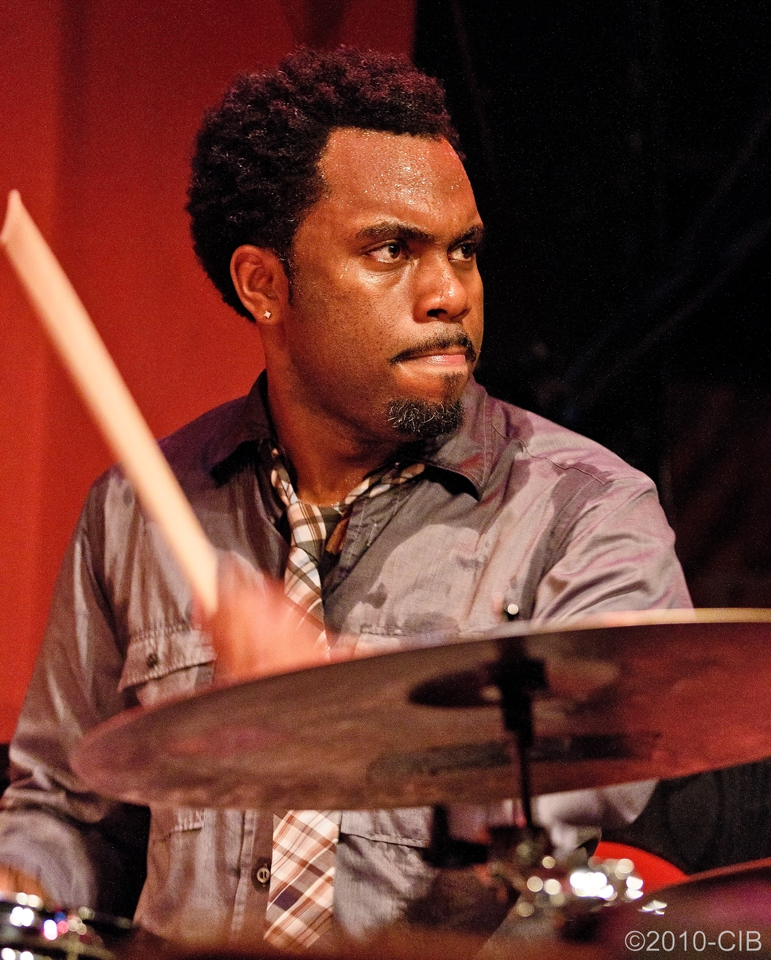 Nate Smith |
Nate Smith, drums Ira Nathaniel “Nate” Smith (b. December 14, 1974) is an American drummer, composer, songwriter and producer. Born and raised in Chesapeake, Virginia, his musical talent became apparent at the age of eleven, after picking up the drums and learning to play the piano by ear. After high school, he went on to earn a percussion performance scholarship and pursued his musical studies at James Madison University, where he received a B.S. in Media Arts and Design in 1997. While still in college, Nate was recruited by the great jazz singer Betty Carter to participate in her esteemed Jazz Ahead program, which has produced an impressive list of alumni including Jason Moran, Cyrus Chestnut, Jacky Terrason, and Casey Benjamin, among many others. After college, he was invited to continue his studies at Virginia Commonwealth University as a member of the Carpenter Fellowship Program. In graduate school he met and performed with the legendary jazz bassist and composer Dave Holland. He continued to perform occasionally with Dave over the next few years, finally joining his GRAMMY-award winning Quintet and Big Band in 2003. In early 2004, he joined saxophonist Chris Potter’s group Chris Potter Underground, and has since recorded three albums with the ensemble. Since then, he has gone on to play or record with an array of fantastic and diverse artists, including: Ravi Coltrane, Jose James, Nicholas Payton, John Pattituci, Adam Rogers, Regina Carter, Mark de Clive-Lowe andLionel Loueke. In 2012, Mr. Smith did a 35-City US/Europe tour with pop songwriting legend Joe Jackson. He has appeared on The Today Show, Late Night with Jimmy Fallon, The Late Show with David Letterman and Conan. He was featured in the October 2012 issue of Modern Drummer magazine, and a full-length web interview with iDrum magazine. |
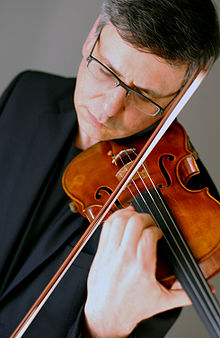 Mark Feldman |
Mark Feldman, violin Mark Feldman (born 1955 in Chicago) is an American jazz violinist. Feldman worked in Chicago from 1973 to 1980, and in Nashville, Tennessee from 1980 to 1986. He worked in New York City and Western Europe from 1986. Feldman often works with John Zorn, Sylvie Courvoisier, John Abercrombie, The Masada String Trio, Dave Douglas, Uri Caine, and Billy Hart. He has played on recordings by Michael Brecker, Lee Konitz, Joe Lovano, and Chris Potter. At New York’s Lincoln Center he played in duo with pianists Paul Bley and Muhal Richard Abrams. In 2010 Feldman Released two Recordings. “Oblivia” a duo recording of original music with pianist/composer Sylvie Courvoisier on Tzadik Records. “To Fly To Steal” with the Mark Feldman/Sylvie Courvoisier Quartet Featuring Bassist Thomas Morgan And Drummer Gerry Hemmingway on The Swiss Label Intakt. In 2006, Feldman’s recording What Exit was released on ECM,which featured British Pianist John Taylor. In 1995 he released Music for Violin Alone, a collection of his Improvisations for Solo Violin, on Tzadik Records. In 2000 he released Book of Tells on Enja Records, a recording of his compositions for string quartet. In September 2012, Feldman co-produced with violinist Jean-Luc Ponty, the debut album of Scott Tixier by writing the liner notes for the release on Sunnyside Records. Feldman is married to the Swiss pianist Sylvie Courvoisier. |
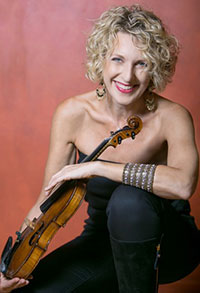 Joyce Hammann |
Joyce Hammann, violin Equally at home on the concert stage, in a jazz club, or in front of 17,000 screaming fans at a rock concert, Joyce Hammann’s musical versatility and virtuosity remarkably distinguish her from the rest. Her performances have been hailed as “splendid soloing” and as having a “sweet, rich tone” by The New York Times. Performing and recording with such artists as Paul McCartney, Sting, Michael Jackson and Bruce Springsteen, Joyce’s discography includes John Zorn’s String Quartets, Sam Zyman’sBashe, Uri Caine’s Wagner and Venezia, Mozart Re-imagined and The Othello Syndrome, Michael Breckers’ Grammy award winning Wide Angles, Gil Goldstein’s Under Rousseau’s Moon, Ted Nash’s Double Quartet and Mark Feldman’s Book of Tells. Currently she is the Concertmaster for the longest running show on Broadway, The Phantom of the Opera. She continues to perform as a member of The Harlem Chamber Players, The Craftsbury Chamber Players (Vermont) and The Meeting House Players (Cape Cod). Joyce will be touring Europe with Uri Caine as solo violinist with his jazz ensemble and as concertmaster for Fred Hersch’s Coma Dreams, jazz theater project. Source: http://about.me/joycehammann |
 Lois Martin |
Lois Martin, viola The violist Lois Martin is originally from York, Pennsylvania. After graduating from the Eastman School of Music, she moved to New York for graduate studies at The Juilliard School. She is a founding member of the Atlantic String Quartet, which is dedicated to the performance of newly written compositions. Her continuing commitment to contemporary music includes performances with the Group for Contemporary Music, the ISCM Chamber Players, the Ensemble Sospeso, Ensemble 21, the New York New Music Ensemble, Speculum Musicae, the Composers’ Guild, the Da Capo Chamber Players, the Composers Forum and Steve Reich and Musicians. Currently, she is principal violist for the Stamford Symphony, OK Mozart Festival and The Little Orchestra Society, and is a member of the Orchestra of St Luke’s. She is also on the faculty of the Composers Conference at Wellesley College and has taught at Princeton University. Throughout her career, she has recorded more than sixty chamber music pieces in many different genres including the GRAMMY® Award-winning CD Wide Angels, with Michael Brecker. |
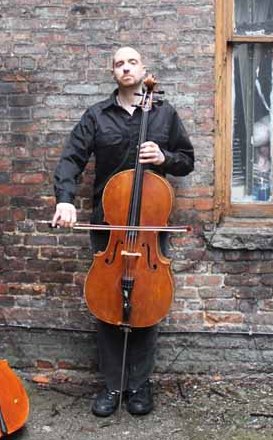 David Eggar |
David Eggar, cello Dave Eggar is an American cellist, pianist and composer. Eggar was a musical prodigy as a child, beginning to play the cello and piano at age three and performing as a singer and actor on Broadway and at the Metropolitan Opera at age seven. He trained as a classical cellist at the Juilliard School, and later graduated from Harvard University and the Juilliard School’s Doctoral Program. He debuted in Carnegie Hall at 15 as the youngest winner in the history of the Artists International competition. He has appeared throughout the world as a classical soloist, including concerto appearances at Avery Fisher Hall, Carnegie Hall,London’s Barbican Center, the Paris Opera, and the Hollywood Bowl. In fact, that is Dave’s cello leading the way at the top of Coldplay’s “Viva La Vida.” Eggar was a founding member of the FLUX quartet, and has premiered over 100 works of contemporary music, including pieces by Frank Zappa, Charles Ives, Beth Anderson, John Cage,Conlon Nancarrow, Elliott Sharp, Ornette Coleman, John Pattitucci, Oliver Lake, Morton Feldman, Sir Harrison Birtwistle, David Chesky, Gil Evans, Somei Satoh, Lamonte Young, Kirk Hammett, and Augusta Read Thomas. |
![]() About Larry Isacson
About Larry Isacson
| Thinking about purchasing this album?
Follow this link for more album details or to make the purchase. Buy it now |
“Not just recommended. Guaranteed.”
We stand behind every album featured on Expedition Audio. Our objective is to take the monetary risk out of music exploration. If you order this album from HBDirect.com and do not like it you can return it for a refund.
Chris Potter Underground; 'The Wheel' - LIVE in Stuttgart, 2009
